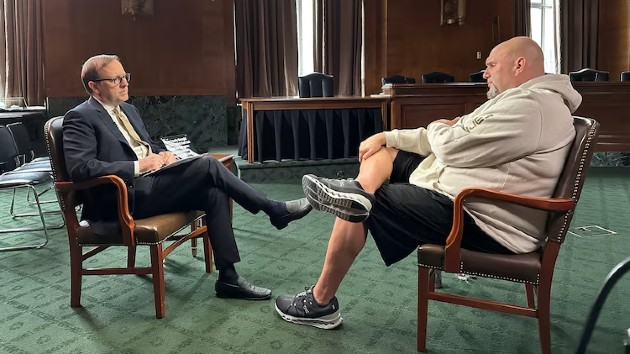End of expanded SNAP benefits may push Black, Latino communities into poverty: Study
Written by ABC AUDIO on March 1, 2023

(NEW YORK) — When Alyn Carroll received information that her Supplemental Nutrition Assistance Program (SNAP) will soon be substantially decreased, her emotions almost overtook her.
“I wanted to cry,” Carroll, 56, told ABC News. “I wanted to cry because I just started feeling comfortable where I could budget every week a certain amount of money to spend and I did OK with that. But now, they taking that back? It’s like, what is a person to do?”
Carroll, who lives in Baltimore, has been using SNAP to buy food for around seven years and said it is a crucial part of her grocery budget as a person with diabetes. The remaining SNAP emergency allotments that were expanded during the COVID-19 pandemic are set to expire, however — and Carroll’s monthly SNAP check will go from $283 to just $56, she said.
“You can’t survive off of $56 a week, let alone four weeks,” she said. “That extra money helped. I mean, it didn’t fix the problem, but it helped greatly. With them taking those funds back, it’s going to be terrible because we already didn’t have enough money to feed our families.”
While nearly 30 million Americans could see reduced payments when the expanded SNAP benefits expire, Black and Latino communities may be pushed back below the poverty line without the support of the emergency allotments, which were temporarily extended during a time of financial and economic hardship from the pandemic.
According to a study from the Urban Institute, SNAP’s benefits kept 4.2 million people out of poverty since the fourth quarter of 2021, with the largest poverty reduction from the program for Black and Hispanic people.
The emergency allotments reduced poverty by 10% and child poverty by 14% in their states, according to the study.
Eighteen states have already ended the extra SNAP benefits, impacting some 12 million Americans. The remaining 32 states and the jurisdictions of Washington, D.C., Guam and the U.S. Virgin Islands follow suit on Wednesday.
“It’s important to know that communities of color have a higher rate of poverty at a national and statewide level than their white counterparts. Because of that, they’re already at a disadvantage in terms of access to benefits,” said Gina Plata-Nino, Food Research and Action Center (FRAC) deputy director for SNAP.
The FRAC prioritizes improving the nutrition, health and well-being of people struggling against poverty-related hunger in the U.S. through advocacy, partnerships, and by advancing bold and equitable policy solutions, according to its website.
According to the U.S. Census Household Pulse Survey data, food insufficiency — or “sometimes” or “often” not having enough to eat — continues to be over twice as high for Black and Latino adults compared to white adults.
“SNAP is able to protect people. It pushes them out of the poverty hole. It allows them to have enough resources to be able to feed their kiddos and I think it’s important to know that while this is the Supplemental Nutrition Assistance Program for many of these families, it is also their one sole income to feed their families,” Plata-Nino said.
While Carroll is solely responsible for finding food for herself, she expressed empathy for those in her community with families who will struggle because of the end of SNAP’s emergency benefits.
She said she also worries how food banks will be able to pivot during a time of record inflation, with food prices up 10.1% in January, compared with a year ago, according to the U.S. Bureau of Labor Statistics.
President and CEO of the Atlanta Community Food Bank Kevin Waide told ABC News that his organization currently spends around $2 million just for food purchases, a record-breaking number for the facility.
“Food banks are sourcing food from donations from federal commodity support and food that we buy, and for every dollar of food resources that are taken out of the SNAP program, we have to find a way to make up for that,” Waide said.
“And so that means we’ve got to go raise more money, buy more food donations, buy more food. And at the scale that we’re talking about, that’s just a very challenging proposition right now in our food bank. … And even now, we are not meeting the food needs in our community. I don’t think, given the level of demand that’s out there,” he said.
The bank serves 600,000 people in 29 counties across Georgia, one of the states that discontinued SNAP’s emergency allotments after May 2022. Since then, Waide said, his food bank saw a 30% increase in visits.
Georgia Gov. Brian Kemp’s office has pointed to low unemployment and other positive economic news in the state, in light of the reduced benefits, but said last year: “If any Georgian or Georgia families are experiencing food insecurity, we have many other statewide programs to help support them.”
“The state made its decision for a variety of reasons, not just because they didn’t want to extend benefits, but there are other factors that went into that decision,” Waide said.
That had real consequences, he told ABC News.
“So many families across our community are facing significant financial pressure right now, and losing $100 a month really puts them in harm’s way,” he said. “We hear that every day from our neighbors that we’re serving, that that additional money has helped them keep food on the table as food prices have continued to increase and as they’re trying to recover from the long-term effects of the pandemic.”
Although some households may see around $95 or less gone in their budget for groceries, according to the Center on Budget and Policy Priorities, a left-leaning think tank, factors such as family size and income can result in some families losing hundreds of dollars each month.
From butter’s price recently rising an average of 31% to bread being up 15%, year over year, according to inflation data, SNAP users like Carroll look to the legislators to help those in the community who need it most.
“I’m just hoping that the government can find a way to give people some funds back that they’ve taken away to help our community survive,” she said. “Because we’re not surviving right now. We’re just barely existing. We want to do better, but we need help.”
Copyright © 2023, ABC Audio. All rights reserved.






